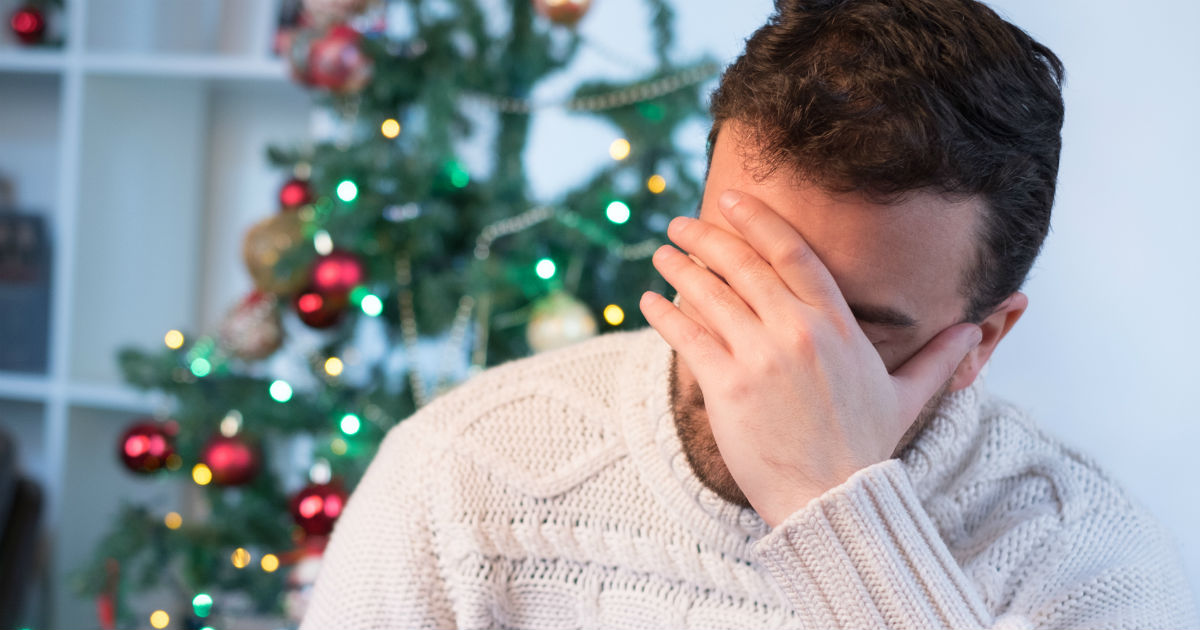
Don’t be surprised if your holiday plate has an enormous helping of stress piled alongside the turkey, stuffing and pumpkin pie. Stress is the unwanted gift that keeps emerging throughout the holiday season from Thanksgiving to New Year’s Day, whether it’s over travel plans, cooking a fabulous meal, finding the perfect gift, dealing with difficult relatives, putting up decorations or having unreasonable expectations.
This time of year may be especially draining if you have cancer—whether you are in survivorship, in treatment or newly diagnosed—because the holiday stress may compound cancer-related stress you may already be experiencing. This year, of course, there’s added stress from COVID-19 and figuring out how to celebrate safely during the pandemic.
“Some of these pre-existing issues—like the physical, the psychological and the financial—just sort of follow us into the holidays,” says Elaine Smith, MS, LMFT, a licensed Marital and Family Therapist at Cancer Treatment Centers of America® (CTCA), Atlanta. “So, we have to really step back and think: What are my expectations, what can I actually do, and how can I make this a pleasurable memory for myself? How can I communicate with my family about what would be important to me?”
Extra stress is never good, but it may pose even more serious consequences for cancer patients. Stress doesn’t cause cancer, but it may contribute to the growth of tumors in patients battling the disease.
The holiday goal then is to find creative ways to reduce stress when possible. “The whole idea of the holidays is to make memories,” Smith says. “There’s no recipe for what those memories need to look like. Those are defined by your and your family.”
Why is stress so bad?
It’s important to understand how stress affects us. The body’s reaction to stressful situations is designed as a protective response, like when you’re suddenly scared or caught by surprise. The perceived threat quickly triggers a “fight or flight” response that releases adrenaline, cortisol—the primary stress hormone—and other hormones to handle the emergency.
Adrenaline makes the heart race and blood pressure spike, while cortisol produces an increase in blood sugars. Usually, these symptoms subside quickly and return to normal once an episode has passed. However, when you experience chronic stress—such as from a cancer diagnosis—those symptoms may not go away easily.
Experts are still studying the effects of stress on the body. Current research suggests a connection may exist between stress, inflammation and cancer, in particular for those who are already undergoing treatment for the disease. A 2017 research review showed other ways that continuous, prolonged stress may harm your health, including gastrointestinal problems, depression and high blood pressure.
So, reducing stress may help improve your overall health and provide less ammunition to fuel the growth of existing cancer tumors . “We have ways we can reduce that cortisone and adrenaline and help us manage the situation, instead of being a psychological prisoner to worry and fear,” Smith says.
Coping with the holidays
So, how should you handle the five-week holiday season to keep your stress from becoming overwhelming?
“What we want to do is have a plan that loved ones and cancer patients make together, that doesn’t have pressure, that doesn’t have unrealistic expectations,” Smith says. “Have a plan that, when we get to Jan. 1, when we make that resolution for the New Year, we can look back and realize we created a couple of new traditions, or we kept in touch, or we exchanged lovely cards with one another.”
Exercise and being active overall are important ways to control stress. Staying active may be difficult for cancer patients experiencing fatigue, but medical professionals say even some activity based on your physical abilities can make a difference. Always check with your doctor or care team if you’re considering a new exercise plan.
“Make sure that you’re continuing during the holidays to work your self-care program in a way that keeps you in a good place on your cancer treatment journey,” Smith says. Other tips include:
Make time to relax. Add some behavioral health techniques to your schedule, such as deep-breathing exercises, meditation or yoga.
Do what you enjoy. Family obligations may tug at you, but make room for some favorite hobbies, whether it’s reading, writing, painting, drawing, fishing, gardening or playing a musical instrument.
Get outdoors. The natural world can provide a welcome escape and a source of inspiration, allowing us to breathe fresh air, delight in the beauty of the world and gain calm and perspective.
Accept help from others. Simplify your celebration by allowing others to chip in with the cooking, shopping, cleaning, decorating and other holiday preparations.
Set priorities and feel free to give yourself a pass. Doing all your traditional holiday activities may make you fatigued, so save your energy for the ones that are most important to you. “A lot of the stressors we get from the holidays are what we think we have to do: money we have to spend, places we have to go, meals we have to cook. Those don’t necessarily really bring us happiness, cancer patient or not,” Smith says.
Watch your diet. It’s tough to do during the holidays, but limiting the sugar, alcohol and caffeine you consume may reduce your stress levels. As often as you can, eat small meals throughout the day and stay hydrated. “Just rememberthat during the holidays, when those baked goods come out, some of that stuff just might not be good for you,” Smith says. A nibble is fine, but your body will feel better the more you follow a balanced, nutritious diet.
Avoid unhealthy coping behaviors. Don’t turn to excessive tobacco, alcohol or drug use—or just eating too much—to deal with your cancer or holiday stress. These behaviors may have long-term health consequences, resulting in substance abuse, weight gain and impaired cardiovascular and respiratory health, among other conditions.
Get enough sleep. Rest is a wonderful way to rejuvenate your body and keep you on an even keel. Try to get a good night’s sleep each night and sneak in afternoon naps when you can.
Confide in others. Keeping your emotions over a cancer diagnosis bottled up may increase your stress. Share your concerns with your doctor or care team, which may be able to prescribe medications if you’re consumed with anxiety and depression. Also, be open with family and friends who may be able to provide emotional support and who want to be there for you.
Maintain realistic expectations. There are bound to be disappointments during the holidays, maybe due to your health condition or the inability to gather with others because of the COVID-19 pandemic. Focus on making good use of your time and accepting the limitations.
Don’t forget to laugh. A good laugh can go a long way to relieving stress. Research has shown that laughter can reduce pain, decrease stress-related hormones and boost the immune system.
Let the music move you. Whether your favorite tunes are classical, classic rock or spiritual hymns, listening to or singing along to music that speaks to your soul may help you relieve stress.
What about travel?
With COVID-19 cases hitting new highs across the United States, the U.S. Centers for Disease Control and Prevention is recommending against travel during the holidays and suggesting celebrations should be limited to people in your normal household. Use Zoom, FaceTime or other technologies to join with other loved ones and share in the holiday festivities.
If you decide to travel by air, a number of services are available to cancer patients and others with medical needs to reduce the stress of flying and help you through the experience, from traversing the airport, to clearing airport security, to boarding at the gate.
The Transportation Security Administration (TSA) has TSA Cares, a program with a toll-free helpline, 855-787-2227. Travelers can call ahead to ask about alternative screening options for specific conditions, or to arrange for a trained passenger support specialist to help them through the security process. TSA recommends travelers call the hotline 72 hours before their scheduled flight. Travelers may also use TSA Cares’ social media platforms to ask questions. Live assistance is available 365 days a year via Twitter using the handle, @AskTSA, or travelers may also send questions to TSA via Facebook Messenger on the agency’s Facebook page.
Those who don’t call ahead—and who don’t want to discuss their medical condition in front of strangers—have another option: TSA notification cards. A traveler’s medical condition is written on the card and handed to the TSA officer, who can arrange for a screening to take place in private. The card does not exempt anyone from being screened, but it offers a discreet way to notify officers at the checkpoint that additional accommodations are needed.
Here are some other things you can do to make your air travel easier:
- Request a wheelchair in the airport if you’re not able to do a lot of walking.
- Ask to board your plane early, or to have assistance when boarding.
- Place all your medicines and medical equipment in your carry-on bags, so they’re still with you if your checked luggage is lost.
Balance is the key
Handling stress well during the holiday season may depend on how well you’re able to live your life one day at a time.
“If we live yesterday, we can’t change it. If we live tomorrow, it’s anticipation. But if we live today, we only have that one ball to juggle. We don’t have to juggle three balls: past, present and future,” Smith says. “We can really look at the present and see how we can add some skills, some coping skills, to make that a really healthy day for ourselves.”



